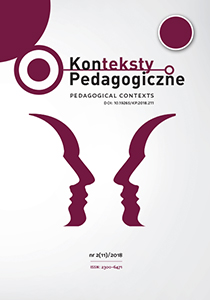Abstrakt
Oczekiwane obecnie kompetencje obywateli w zakresie technolo-gii cyfrowej wykraczają poza tradycyjnie rozumianą alfabetyzację komputerową i biegłość w zakresie korzystania z technologii. Owszem, te umiejętności są na-dal potrzebne, ale nie są wystarczające w czasach, gdy informatyka staje się po-wszechnym językiem niemal każdej dziedziny i wyposaża je w nowe narzędzia. Podstawowe zadanie szkoły – alfabetyzacja w zakresie czytania, pisania i racho-wania – wymaga poszerzenia o alfabetyzację w zakresie umiejętności programo-wania, które w gruncie rzeczy jest systemowym rozwiązywaniem problemów składającym się z czterech etapów: dekompozycji, tzn. rozkładu na składowe danego problemu, zidentyfikowania występujących w nim prawidłowości, czyli analizy, abstrahowania, tj. eliminowania nieistotnych elementów, i tworzenia algorytmu, a więc rozwiązania danego problemu krok po kroku. W myśleniu komputacyjnym podkreśla się rolę, jaką odgrywają komputery (wówczas jest ono rodzajem porządkowania danych i formułowania problemów oraz rozwią-zań w taki sposób, by były zrozumiałe również dla komputerów), i dodaje etapy związane z tłumaczeniem rozwiązania na język zrozumiały dla komputera – programowanie, w tym kodowanie, a także znajdowanie innych zastosowań danego algorytmu/rozwiązania/adaptacja do innych kontekstów (http://www.ceo.org.pl/sites/default/files/newsfiles/elementy_myslenia_komputacyjnego_wedlug_ceo.pdf.) Empiria organizuje specjalistyczne zajęcia warsztatowe z wy-korzystaniem nowoczesnych technologii, które mają na celu integrację i po-szerzenie treści podstawy programowej w zakresie edukacji, przede wszystkim edukacji informatycznej, w myśl założenia, aby dzieci w przyszłości stały się twórcami kultury cyfrowej, nie tylko jej biernymi odbiorcami. Podczas zajęć najważniejsza jest praktyka, którą realizuje poprzez tablety każdy uczestnik. Wartości, którymi kieruje się Empiria, to: nowoczesna edukacja (z wykorzy-staniem technologii mobilnych), poznanie empiryczne (ciągła i praktyczna ak-tywność), mobilność (dostępność usług firmy w całej Polsce), radość, inspiracja, wolność.
Bibliografia
Bednarek, J. (2006). Multimedia w kształceniu. Warszawa: Wydawnictwo Naukowe PWN.
Gańko-Karwowska, M. (2002). Efektywność wykorzystania narzędzi technologii infor-matycznej w szkołach podstawowych (w aspekcie kompetencji informatycznych nauczy-cieli). Szczecin: Wydawnictwo Hogben S.C.
Hassa, A. (1998). Komputer jako środek dydaktyczny w edukacji wczesnoszkolnej. Komputer w Szkole, 1, 89.
http://eduempiria.pl/warsztaty/inspiracje-multimedialne/#wybierz-tematy [accessed: 20.04.2018].
http://eduempiria.pl/warsztaty/programowanie/?PHPSESSID=ab8092f49774be514da09da02f3f36af ). [accessed: 20.04.2018].
http://eduempiria.pl/warsztaty/warsztaty-filmu-animowanego/ [accessed: 20.04.2018].
http:/eduempiria.pl/warsztaty/programowanie/ [accessed: 20.04.2018].
https://men.gov.pl/wp-content/uploads/2016/11/podstawa-programowa-z-informaty-ki-szkola-podstawowa.pdf [accessed: 20.04.2018].
https://www.corobic.pl/biznes/empiria-1008 [accessed: 23.04.2018].
Marciniak, M. (2018). Studenckie strategie korzystania z mediów – blokada osiągnięć akademickich. Konteksty Pedagogiczne, 1(10), 157–167.
Michalak, R. (2016). Edukacja najmłodszych kontekstem kształtowania motywacji do uczenia się. Ogląd zjawiska w badaniach własnych. Konteksty Pedagogiczne, 2(7), 81–95.
Myślenie komputacyjne w rozumieniu Centrum Edukacji Obywatelskiej, http://www.ceo.org.pl/sites/default/files/news-files/elementy_myslenia_komputacyjnego_wedlug_ceo.pdf [accessed: 20.04.2018].
Wprowadzić dzieci w cyfrowy świat – wywiad z Jolantą Okuniewską, https://www.juniorowo.pl/wprowadzic-dzieci-w-cyfrowy-swiat-wywiad-z-jolanta-okuniewska/ [accessed: 24.04.2018].
Pytel, K. (2010). Technologia informacyjna w edukacji. Edukacja – Technika – Infor-matyka, 1, 57–62.
Regulamin korzystania z usług Eduempiria, http://eduempiria.pl/regulamin/ [accessed: 20.04.2018].
Rozporządzenie Ministra Edukacji Narodowej z dnia 14 lutego 2017 r. w sprawie podstawy programowej wychowania przedszkolnego oraz podstawy programo-wej kształcenia ogólnego dla szkoły podstawowej, w tym dla uczniów z niepełno-sprawnością intelektualną w stopniu umiarkowanym lub znacznym, kształcenia ogólnego dla branżowej szkoły I stopnia, kształcenia ogólnego dla szkoły specjalnej przysposabiającej do pracy oraz kształcenia ogólnego dla szkoły policealnej. Dz.U. z 2017 r., poz. 356.
Sysło, M. (2014). Myślenie komutacyjne. Nowe spojrzenie na kompetencje infor-matyczne. In: A.B. Kwiatkowska & M. Sysło (eds.), Informatyka w edukacji. Infor-matyka dla wszystkich od najmłodszych lat (p. 15–32). Toruń: Wydawnictwo Nau-kowe Uniwersytetu Mikołaja Kopernika.
Walat, A.(2007). Zarys dydaktyki informatyki. Warszawa: Ośrodek Edukacji Infor-matycznej i Zastosowań Komputerów.
Warsztaty multimedialne dla dzieci (e – sztuka), https://www.corobic.pl/atrakcje/Kom-puter/warsztaty-multimedialne-dla-dzieci-e-sztuka-2861 [accessed: 23.04.2018].
Autor zgodnie z zaleceniem MNiSW, by przeciwdziałać praktykom „ghostwriting” i „guest authorship” składając tekst dołącza oświadczenie Autora/Autorów, w którym deklaruje wkład każdego z Autorów w powstawanie publikacji. Własnoręcznie podpisane oświadczenie należy przesłać na adres redakcji:
Joanna Skibska | w formie skanu przesłać poprzez system OJS (biblioteka wydawcy).
Autorzy nie ponoszą żadnych kosztów w związku z publikacją artykułu na łamach czasopisma Konteksty Pedagogiczne oraz nie otrzymują gratyfikacji finansowej za opublikowanie tekstu. Redakcja zastrzega sobie prawo do wprowadzania niewielkich zmian w artykułach, które nie mają wpływu na merytoryczną stronę publikacji.
Autor (Autorzy) artykułu oświadcza, że przesłane opracowanie nie narusza praw autorskich osób trzecich. Wyraża zgodę na poddanie artykułu procedurze recenzji oraz dokonanie zmian redakcyjnych. Przenosi nieodpłatnie na Wydawnictwo Libron autorskie prawa majątkowe do utworu na polach eksploatacji wymienionych w art. 50 Ustawy z dnia 4 lutego 1994 r. o prawie autorskim i prawach pokrewnych – pod warunkiem, że praca została zaakceptowana do publikacji i opublikowana.
Wydawnictwo Libron posiada autorskie prawa majątkowe do wszystkich treści czasopisma. Zamieszczenie tekstu artykuły w repozytorium, na stronie domowej autora lub na innej stronie jest dozwolone o ile nie wiąże się z pozyskiwaniem korzyści majątkowych, a tekst wyposażony będzie w informacje źródłowe (w tym również tytuł, rok, numer i adres internetowy czasopisma).
Tekst jest udostępniany w internecie na licencji CC-BY-SA

